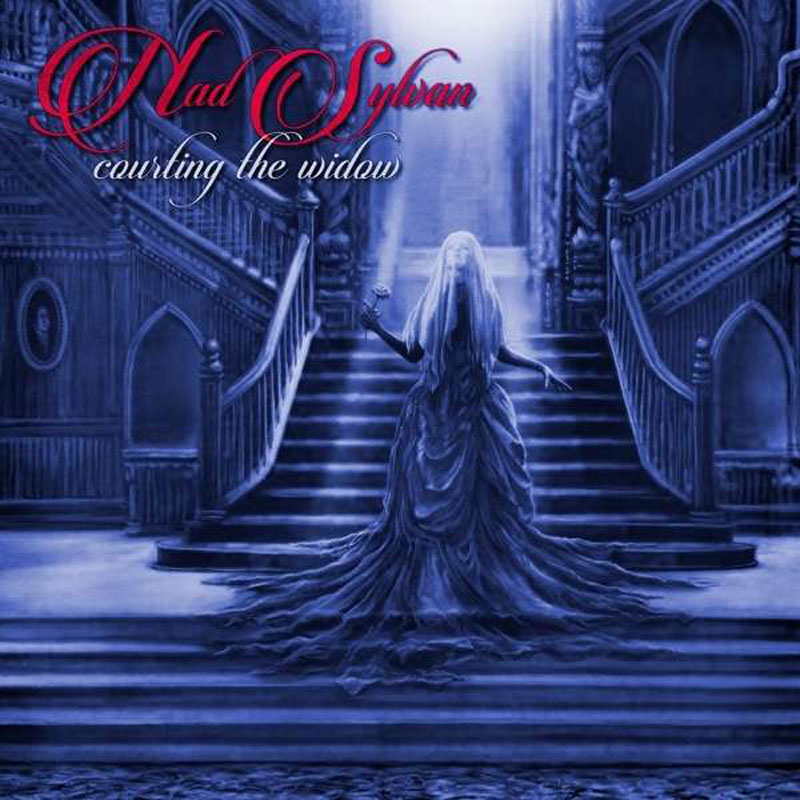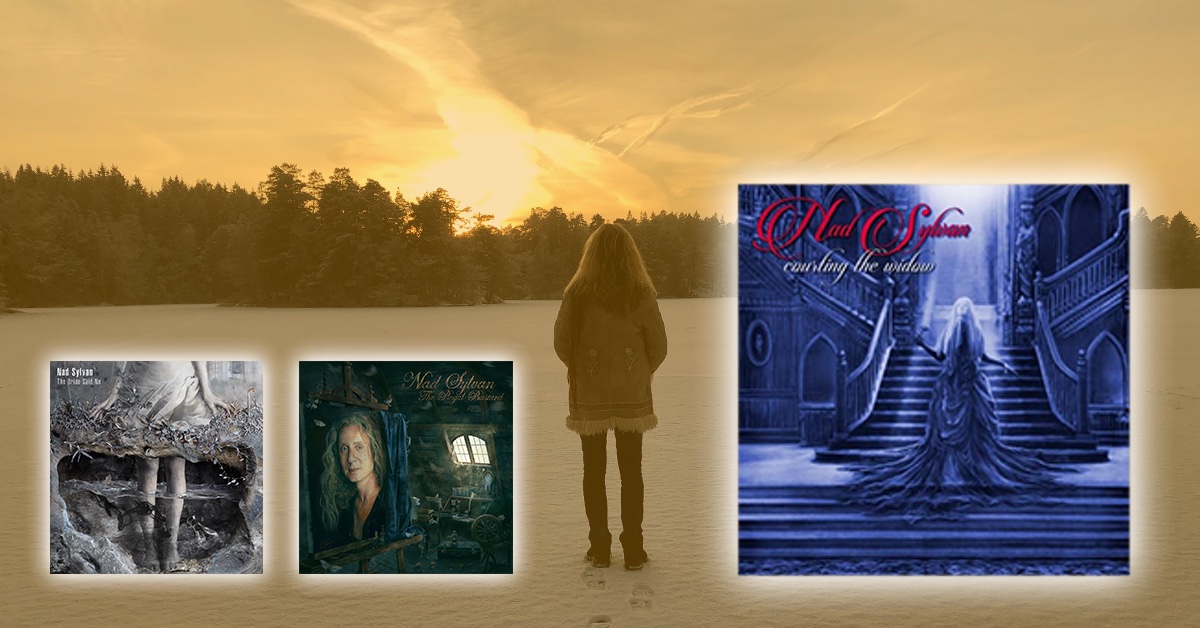- Article
- Read in 8 minutes
Nad Sylvan – Vampirate Trilogy – Part 1: Courting The Widow (2015)
The first instalment of the Vampirate Trilogy came out in 2015. Ole Uhtenwoldt shares his impressions on Courting rnThe Widow.
Prologue | Courting The Widow | The Bride Said No | The Regal Bastard | Epilogue
The trilogy begins in 2015, twelve years after Nad’s previous solo album, Sylvanite(2003).
The booklet notes that the release was a dream come true for Nad and that there was a voice of freedom. In context it makes sense: Nad recorded the album with the tailwinds of being Steve Hackett’s lead vocalist and having quit his job to become a full-time musician. Of course, with the concept of a trilogy you have to really put out in the first part to keep up the momentum of interest in the successors. That must have made it difficult to hit the right notes and keep up the dynamism of the action over such a long period. Let me say up front that Nad nailed it – with sophisticated compositions, versatility and the right musicians. Each of the three albums has its own sound, explores different styles and still give the trilogy a coherent, plausible sound.
The Vampirate has to have a ship, of course, and the first album consequently focuses on topics like sailing and ships. In order to indicate the songs that focus on the Vampirate and his history five of the eight songs have been tagged as “log”, as in the log book entries that have always been used in shipping.
Carry Me Home (7:19)
The album begins, unsurprisingly, with the sound of the surf, with the steps of people boarding a ship and – how could it be otherwise – with the flapping wings of the Vampirate. Carry Me Home is a fresh, optimistic start. A moderate use of instruments lends the song a feeling of a sunny sailing excursion. The song introduces the leitmotif of the sea, and it has been labelled log 1 accordingly.
The musicians get to show their class already in this first song: Nick Beggs’s bass gallops through the foreground of the song as effortlessly as the Vampirate flying through the air. The song flows through some seven minutes, over lovely harmonics, a sing-along chorus that is varied and repeated and a beautiful coda refined by Rob Townsend and his flute. The guitar solo is so characteristic that you do not need to check the booklet to know it’s Steve Hackett. The song also introduces Jade Ell as backing singer – an important job she will keep on the other two albums.
All that remains from the song as the coda fades out is a drop that introduces the title track …
Courting The Widow (6:13)

It begins with Roger King gently playing the piano with some support from keyboard strings. They can frequently make a song sound over the top, though they are a good and fitting idea in this song. The second log entry could be a song of mourning sung by the widow that graces the cover; it is heavier than the opening song and more intense. The Vampirate himself at least is convinced of his idea to get involved with the widow. The song develops in a very felicitous way with keyboard sounds in the final third and some drum variations by Nick d’Virgilio. Sylvan adapts his singing to the song with frequent changes between loud and quiet moments. The song is not the big highlight of the album, but it fits well and makes you wonder how it will go on. And it has two thirds of the Mute Gods, Roger King and Nick Beggs (see our website special on them).
Echoes of Ekwabet (9:41)
The album shifts gears again with this ten-minute song. Nad points out that Echoes Of Ekwabet hits the very style that made him discover this kind of music. The song sounds very much like Genesis indeed as it follows the retro-prog movement. It is versatile, aggressive, harmonious again and oscillates between epic and anthemic sound towards the end. The orchestral elements have been implemented very carefully; a choir comes in, and the song remains strong throughout. Though it does not fully subordinate itself to the Vampirate concept it still fits well – particularly in the way it stands out musically from the previous tracks.
Nad was inspired to write this song by a statue he saw in St Charles (near Chicago); the statue got him interested in the history of the Potowatomi Indians who called it “Ekwabet”. When he picked up on this idea he did not know, of course, that the song would and up on a solo album of his some three-and-a-half years later. Fun fact: Though Nad recorded the guitars he always wanted Steve Hackett to re-record them and put on the finishing touches. Upon listening to the song, Steve declined stating that Nad’s playing was so good that he could not improve on it… what can you say to that!
To Turn The Other Side (22:05)
Epic long tracks are usually placed at the end of an album because they tend to appear a bit lost in the middle. Interestingly, it does not happen to this track.
To Turn The Other Side is not only the longest track by far on this album but also the longest in the whole trilogy (and it does not refer directly to the Vampirate). The eight-part longtrack begins in a melancholy, almost tragic mood. The first part, Premonition, recurs every now and then as an emotional peak. The song does not burn off those classic prog fireworks – it does not need to. The song is well-thought-out and needs no artistic splendor. It flows nicely; this is particularly obvious in the relaxed penultimate part, On The Other Side, before it reverts to the original mood in Lavender Fields and comes to a conciliatory ending. Jonas Reingold plays the bass, and he and Nick d’Virgilio work really well as the rhythm group. If you listen very closely you can hear Nick Beggs singing backing vocals. Spot the quote from Swiss writer and philosopher Henri Frederic Aurel (1821-1881): “Make haste to be kind – swift to love”.
Though the track does not have lots of changes in tempos, rhythms and time signatures, it does present a long track in a way that fits the album very well. This authenticity makes it a highlight.
Ship’s Cat (5:04)
Onwards with the third log. It stands out because of the unusual instruments. The music sounds completely different again without seeming like a foreign body. Ship’s Cat has few instruments: Harmonium starts off, the organ comes in later, as does a piano that assumes the lead role now and again.
The track is a fine example for the way very simple means can create an incredibly melodious song. The strings fit in extremely well, and the song releases an unexpected level of emotionality – and you never quite realize where it comes from. Ship’s Cat is likeable, authentic and its harmonics make it perhaps the most beautiful track on the album. And the only one to have been recorded only by Nad. Well, almost only. This song has the most charming guest musician of the whole album – the Ship’s Cat itself, i.e. Nad’s cat Scrut. The song combines Nad’s vocals with Scrut’s meows and purrs into a duet of sorts. Indeed, when you record much of your album at home while the cat lies purring on the keyboards anyway, why not include that in the album?
The Killing Of The Calm (5:34)
The melancholy is interrupted by a brisk cembalo rhythm; we are in for another log entry. There is no sailor who does not know the calm before the storm; The title is a bit misleading here, because The Killing Of The Calm sounds rather harmless except for a threatening counterpoint towards the end. The vocals sound clear and varied. Annbjorg Lien adds some very clever cello solos during the verses. From here on until the end of the album the drums are taken over by Doane Perry; the cooperation with Nick Beggs works well. In fact, it is well worth noting what Beggs does on the album – considering he recorded both the bass and the vocals while he was touring with Steven Wilson.
Where The Martyr Carved His Name (7:45)
The penultimate tracks begins in a gloomy twilight of tremolo strings before the rhythm section comes in. Jonas Reingold plays the bass. Nick Beggs restricts himself to some excellent backing vocals. Incidenally, this is the only track to which Roine Stolt adds some guitar riffs that rather remain in the background. The narrative arc works well, especially with the heavy organ in the louder sections. The final chorus has a variation that turns into a new melody (a trick similar to the one in Carry Me Home).
The lyrics are a man who is about to be beheaded and the question where his journey will be taking him … there is a certain heaviness to the topic. The song fades out into the surf of the sea which, in turn, takes us to the lighter mood of …
Long Slow Crash Landing (6:34)
The Vampirate crashes into the sea – this is how the log book ends. Rob Townsend’s soprano saxophone, Beggs’ fretless bass and the marching rhythm illustrate this nicely. The verses are continuously “disturbed” by guitars; there are many guitars in this song, and, interestingly, they all only play solos. Nad fulfilled another dream of his in here: he plays a guitar battle with Steve Hackett. Nad himself plays it down: It was not really a duel, he says, because he was a far worse guitar player than Steve Hackett (“in fact, I am a shit guitarist”). Now here’s an understatement because Long Slow Crash Landing is a worthy finale; Sylvan and Hackett play crossing guitar lines and the fretless bass really get going again. The song slowly ebbs away and leaves nothing but the sound of waves.
This is not really the end of the Vampirate. His story continues, of course. But we have reached an interval and look back onto an accomplished first third of the trilogy. It may be a bit harmless a times, but the overall sound is stringent with a plethora of various ideas. It was certain to work out with this musical line-up. And we may say this much: The next parts are going to move in new directions. So what happened to the wooed widow? She was to become a bride but she said, well, no.
… on to the second part: The Bride Said No
Order Courting The Widow from: amazonUK | iTunes
by Ole Uhtenwoldt (06/2019), English by Martin Klinkhardt

